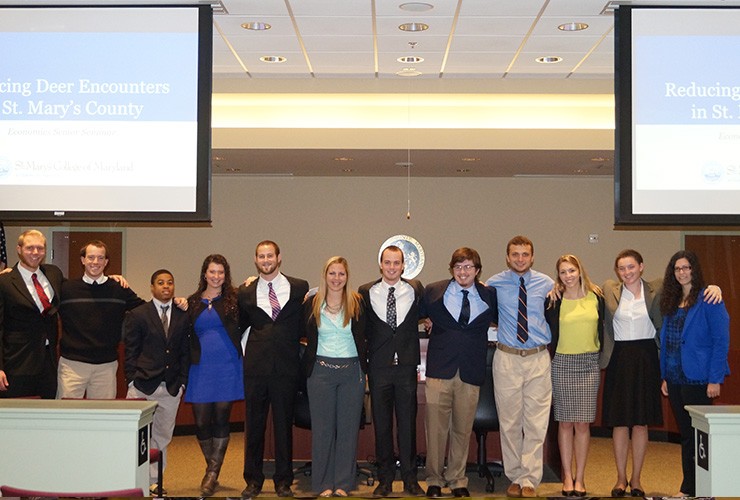Russell Rhine, associate professor of economics, has been selected to work for Congress during the fall semester. He will be a senior economist with the United States Congress Joint Economic Committee, a bipartisan bicameral committee.
SMCM hosts symposium presenting ECON and MATH students
During the spring 2016 semester, students from ECON 459 (Senior Seminar in Economics: Experiential Statistics) and MATH 415 (Applied Statistics) formed teams which provided analytical consulting services to local nonprofit organizations from St. Mary’s, Calvert, and Charles counties. On May 9th, 2016, St. Mary’s College of Maryland hosted a symposium presenting the consulting teams’ findings. This public forum was attended by local stakeholders, including representatives of the nonprofit organizations who received complimentary consulting services. Participating nonprofit organizations included: Calvert Nature Society, Southern Maryland Audubon Society, American Chestnut Land Trust, Chesapeake Charter School, St. Mary’s River Watershed Association, and Historic St. Mary’s City.
Will Schaffer (‘18) has been accepted to attend the London School of Economics in 2016
St. Mary’s student Will Schaffer (‘18) has been accepted to attend the General Course at the London School of Economics and Political Science (LSE) for the 2016-17 academic year.
The General Course at LSE is a fully integrated year of undergraduate study in one of the most vibrant,diverse, and historical cities in the world. General Course students may study any combination of the more than 250 undergraduate courses taught at the school, in disciplines as varied as anthropology, geography, and social policy. General Course students are are fully integrated, both in terms of accommodation and teaching, with LSE undergraduate students, around half of whom come from over 140 countries outside the UK.
Schaffer is an economics major and is from Knoxville, Maryland.
Close Encounters

This semester brought a new course to the Economics Department. “Valuation in Environmental and Natural Resource Economics” is an experimental survey and statistics class that economics majors could take to fulfill their 400-level capstone experience.
One of the motivations for introducing the course into the curriculum, says Dr. Amy Henderson, assistant professor of economics and course instructor, was to provide students the opportunity to use tools they had been developing over the course of their studies to “do economics” by engaging in meaningful applied economic analysis outside the classroom. Henderson also wanted students to have the chance to take more advanced statistics coursework in the major.
Henderson taught students about contingent valuation, a methodology that assigns value to intangible amenities, or, put differently, assesses the monetary demand for things not traded in the marketplace. Students explored the literature on contingent valuation to ascertain state-of-the-art best practices for employing the methodology.
To put their new-found knowledge to the test, the class broke into teams and researched local issues where contingent valuation could be applied. A consensus was formed and they decided to explore the demand for reducing deer vehicle collisions, or DVCs, in St. Mary’s County.
More than one million deer encounters occur each year nationwide, while 32,000 of those encounters occur in Maryland alone; ranking it in the top 15 states for DVCs. According to estimates based on state data, Henderson’s class found that St. Mary’s County experiences about 550 DVCs per year, which causes an approximate $1.65 million in vehicle damages.
After thoroughly researching the DVC issue, the students developed a theoretical policy to construct eight-foot high fencing made of gentle, yet durable, plastic mesh material that would prevent deer crossings in high-risk areas. They developed a survey instrument in accordance with best-practices, and then turned to the local community for input. Focus groups with residents from Leonardtown, Lexington Park and Park Hall helped the students refine the survey instrument before mailing it to the broader community. “This direct engagement with local residents was crucial in developing a clear, credible and effective final survey instrument,” says Henderson.
The survey was mailed to 1,000 randomly selected households in St. Mary’s County. Among several questions, residents were asked their opinion on a one-time tax on county households to fund the deer-fencing project. When surveys were returned, the students again followed best practices to ensure anonymity and accuracy of the data collected. The class statistically analyzed the survey data and concluded that residents placed an estimated $1,064,663 value on the theoretical proposal.
“One of the areas where economics and governance interact is conducting cost-benefit analysis to inform effective policy making,” says Professor of Economics Russell Rhine.
On Dec. 9, in the Commissioners Meeting Room in Leonardtown, Md., Henderson and her students presented their findings before local policy makers—including Dr. Rebecca Bridgett, the county administrator, Mr. Jack Russell, the president of the county commissioners, and Mr. George Erichson, the director of public works and transportation.
“It was certainly a very interesting experience to work with the community and get opinions on not only the survey, but the topic as well,” Kara Kotler ’14 said. “I feel it is important for the college to engage with [members of the] community because they are a great resource for the college.”
An important part of the capstone experience, says Henderson, is transitioning students from learning about economics to doing economics. “My goal is to get students to see the potential of what they’ve been learning all along,” she said. Henderson hopes, too, that her lessons will motivate her students to tackle meaningful projects in their futures.
“Valuation in Environmental and Natural Resource Economics” is expected to be offered every fall; students will study a different topic each year. The course was made possible by a grant from the Andrew W. Mellon Foundation.
From the Newsroom

Faculty Research Connects Entrepreneurship and Deregulation

Dowla Published on the Issue of Adaptation to Climate Change
